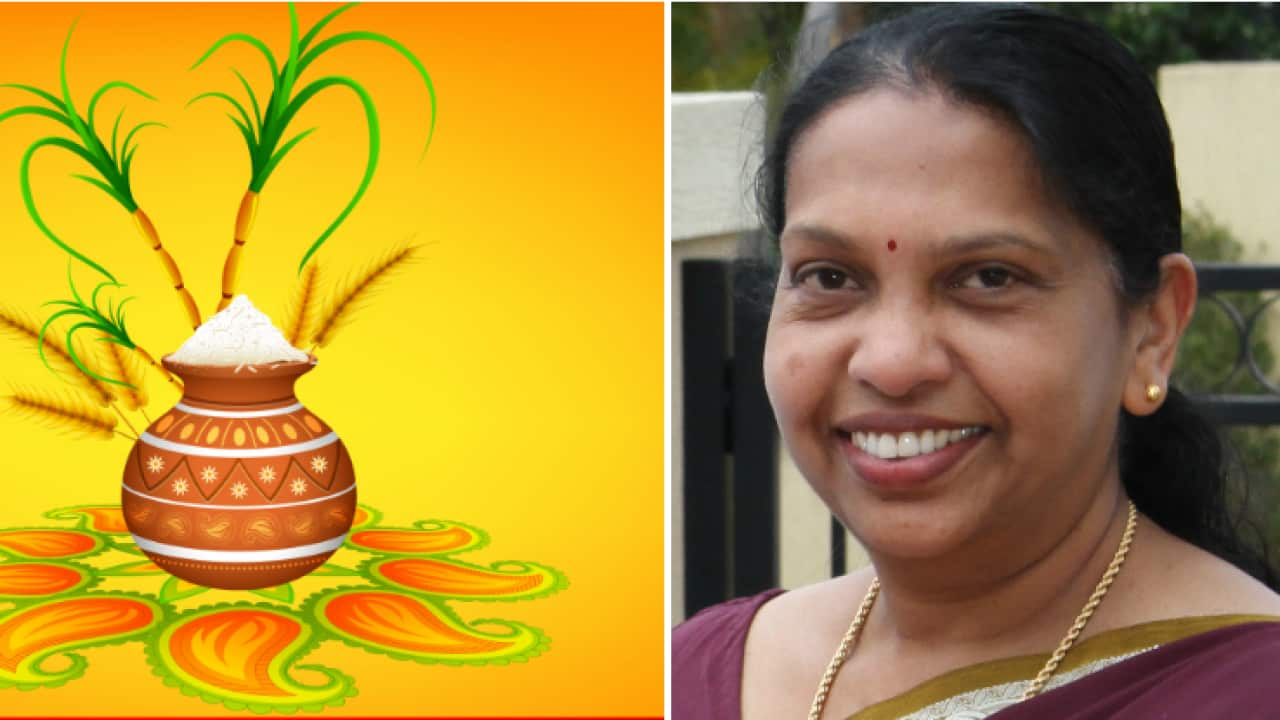Tamils across India held mass protests against the government's ban on the sport in 2017 and members of the Australian Tamil community added their voice to the dissent at demonstrations in Sydney and Melbourne.
"Jallikattu is an ancient and traditional Tamil sport," says Thiru Arumugam, a participant at a Sydney protest in 2017.
"The [ancient] seals of the Indus Valley civilisation depict it, which is proof that this sport was in vogue more than five, six thousand years ago - why ban it now?"
"It is like taking away a part of our lifestyle."
Jallikattu – an annual event in Tamil Nadu, the southern state of India, attracted additional attention in 2017. 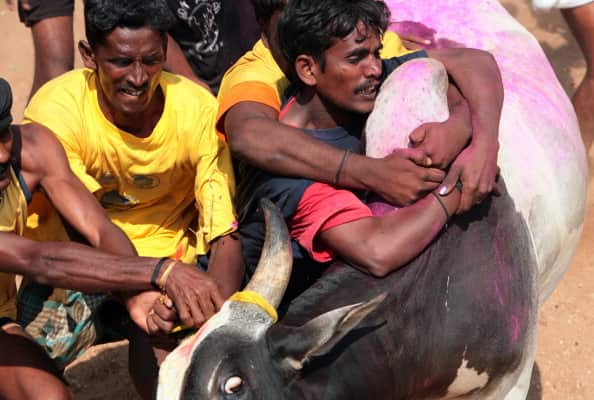 The sport is part of a three-day harvest festival in villages and towns, known as 'Pongal,' in which Tamils offer thanks to the three elements that help with their farming – Sun, Land, and Cattle.
The sport is part of a three-day harvest festival in villages and towns, known as 'Pongal,' in which Tamils offer thanks to the three elements that help with their farming – Sun, Land, and Cattle.

A crowd of men who attempt to catch and ride a bull at a Jallikattu event 2008 in Alanganallur, Indiat - before the ban. (Photos by Palani Mohan/Getty Images) Source: Getty Images
On the third day of celebrations, known as 'Thai Pongal' (which would have been this week - on January 14th) there is a dedicated day to offer thanks to the cattle – a source of wealth for all that they provide: dairy products, fertiliser, and labour for ploughing.
The animals are specially recognised, bathed and decorated with garlands, turmeric water, oil, and colourful rice dust. Their foreheads and horns are painted. Festive games are also held in the villages and towns - one such game is the controversial Jallikattu.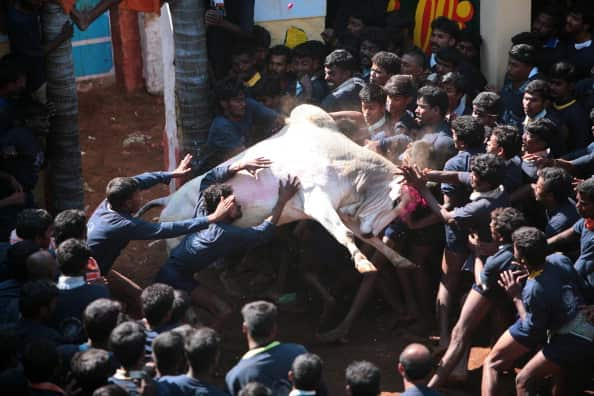 In Jallikattu, bulls are released from pens, with participants challenged to hold on to the animal's hump for as long as possible and attempt to bring the bucking animal to a halt.
In Jallikattu, bulls are released from pens, with participants challenged to hold on to the animal's hump for as long as possible and attempt to bring the bucking animal to a halt.

Participants in Jallikattu are trampled as they attempt to catch the animals, elbowing each other to become the sole rider (Photos by Palani Mohan/Getty Images) Source: Getty Images
In villages and towns, bulls are bred specifically for this event, after which the strongest untameable bulls earn the status of "temple bull" and are used as stud bulls (especially for breeding) throughout the village, in order to carry on their strong genes down the line. The successfully tamed bulls, deemed weak, are used for domestic activities and agriculture.
Ancient Tamil poems dating back to 400 BC describe the bravery of the young men who tame the bull. New Delhi's National Museum also houses a seal from the Indus Valley Civilisation depicting the practice and a cave painting, estimated to be over 2,500 years old has been uncovered in Tamil Nadu in depicting a man trying to control a bull.
In May 2014, the Supreme Court of India banned the practice of Jallikattu after the Animal Welfare Board of India cited extensive evidence of torture and cruelty to the animals. A brief exemption was given to the event prior to 2016's Pongal festival before being reinstated days later. This effectively reinforced the ban, leading to protests all over Tamil Nadu.
In 2017, the Tamil diaspora in Australia also joined in the campaign for lifting the ban on Jallikattu, with protests held in Sydney and Melbourne to coincide with Pongal. Speaking to SBS Tamil, protesters argue that it is a traditional sport in Tamil Nadu and banning the game will also affect cattle breeding.
Speaking to SBS Tamil, protesters argue that it is a traditional sport in Tamil Nadu and banning the game will also affect cattle breeding.
"The [bulls] that win are much in demand for servicing the cows," Sydney protester Vigneswari Mohan explains.
"Stud bulls are reared by people for Jallikattu. Small farmers cannot afford to keep stud bulls, so each village has a common temple bull which services the cows of the village."
Mohan says that Jallikattu is the opportunity to identify the best stud bulls from the farmers' offering.
"The ones which are most virile are preferred by farmers," says Mohan. "The calves from such bulls are in demand."
"By taking this away from the farmers, the Government of India is taking away the very livelihood of farmers in Southern India."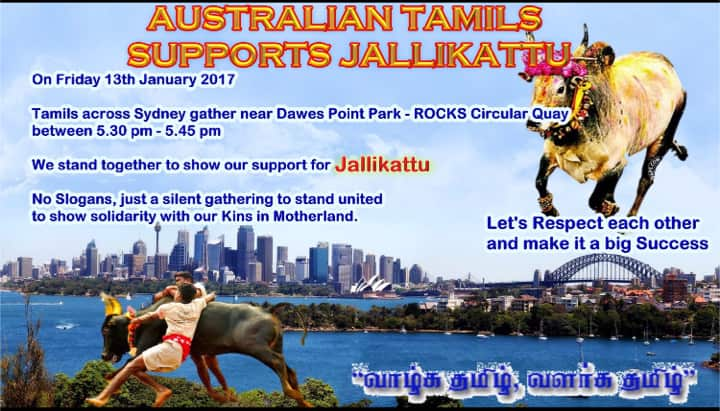 Anu Shivhaani Palaniappan, who was associated with Senaapathy Kangayam Cattle Research Foundation in Tamil Nadu, tells SBS Tamil, "there were hundreds of cattle breeds in India a century ago and now there are only 37."
Anu Shivhaani Palaniappan, who was associated with Senaapathy Kangayam Cattle Research Foundation in Tamil Nadu, tells SBS Tamil, "there were hundreds of cattle breeds in India a century ago and now there are only 37."

Advertisement for a protest by Australian Tamils supporting Jallikattu Source: Supplied
She says, "by banning Jallikattu, which is a practice to strengthen the bulls and bullocks, the multinationals can create a demand for cattle rearing."
"Then, they will introduce their own breed varieties. They want to make money by selling us western cattle - bull semen, medicine, etc." 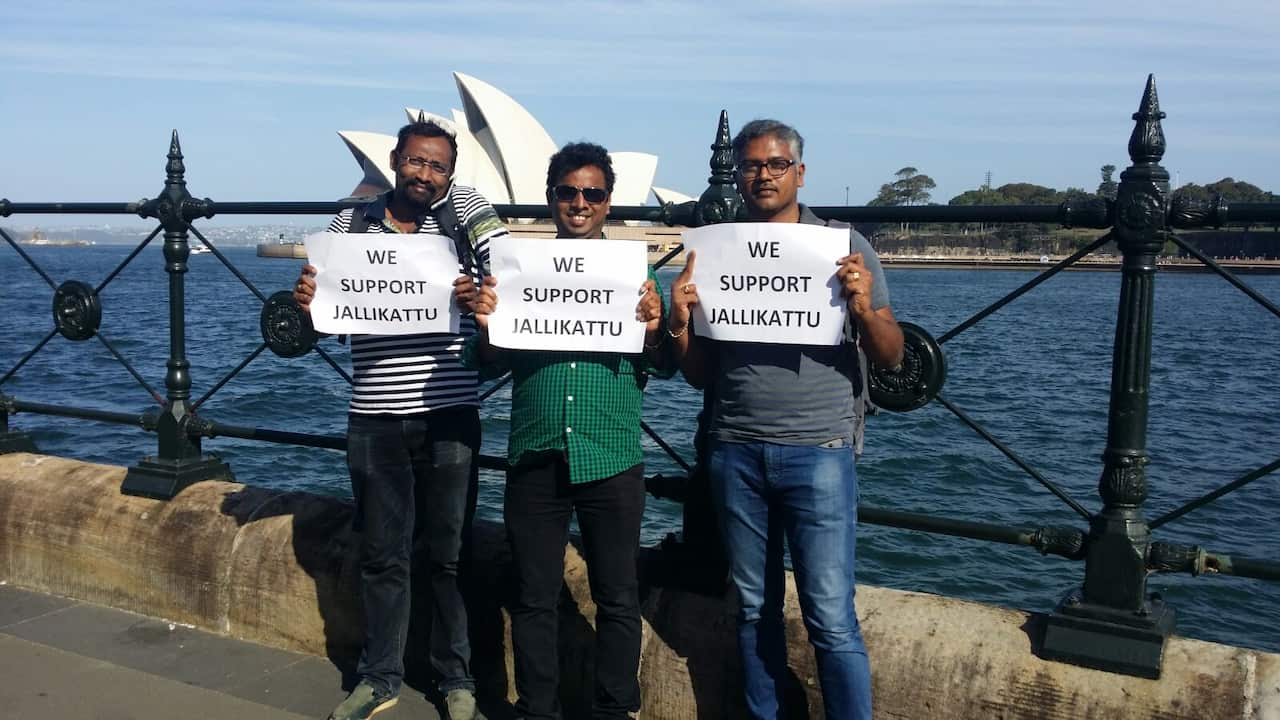 Mathan Raj, one of the organisers of Friday's protest in Sydney, tells SBS Tamil "The ban is a part of globalisation."
Mathan Raj, one of the organisers of Friday's protest in Sydney, tells SBS Tamil "The ban is a part of globalisation."

Protesters in Sydney support the Tamil sport of Jallikattu and speak out against the ban by the Indian government Source: Supplied by Sudhakar Jagadeesan
"The multi-nationals want to introduce their breed of cattle, and PETA India is just a front to make it happen."
Listen to protest organiser Mathan Raj's interview (in Tamil) with SBS Tamil below:PETA India state on their website that: "Jallikattu exploits bulls’ natural nervousness as prey animals by deliberately placing them in a terrifying situation in which they are forced to run away from those they perceive as predators."
PETA India states: "As can be seen in the documentation, Jallikattu participants purposely disorient the bulls by forcing them to consume alcohol; twist and bite their tails; stab and jab them with sickles, spears, knives and sticks; cause them intense pain by yanking their nose ropes; and punch them, jump on them and drag them to the ground."
"I have a question for the [animal] activists," Sundar Raj, a protester at the Sydney rally, tells SBS Tamil. "Do you wear leather shoes? How about a leather belt? Do you eat chicken? Fish? What do you call that? Did those animals wanted to be killed so that they can be eaten?
"Don't tell me that the bulls don't want to be a part of this game.... what would you know about taking real care of the animals."
"I choose to be a vegetarian," says fellow protester Shankar Lal. "I don't see any unwanted abuse during Jallikattu. Fair enough people get hurt – but tell me an outdoor sport where the participants don't get hurt. Players get killed playing the Gentlemen's game, cricket."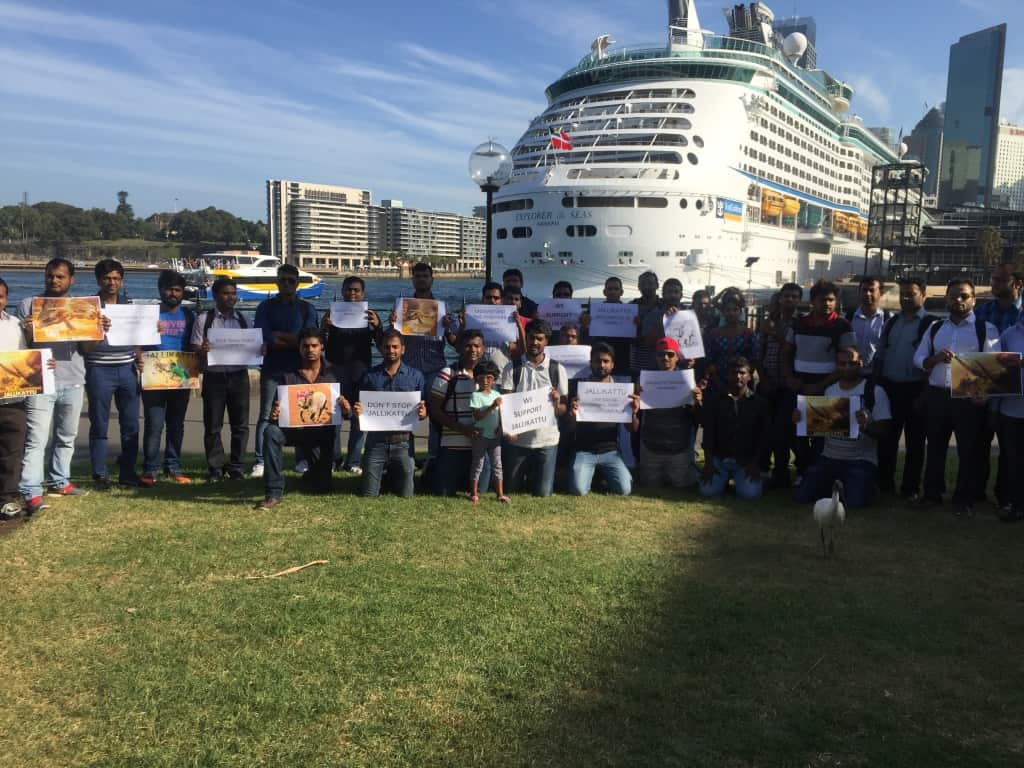 Last year a rally of an estimated 20,000 people opposing the ban of Jallikattu gathered at Tamil Nadu's State Capital of Chennai, reportedly organised by a group of non-political and youth organisations. Since then, many other protests have marched on rallies in various towns of Tamil Nadu.
Last year a rally of an estimated 20,000 people opposing the ban of Jallikattu gathered at Tamil Nadu's State Capital of Chennai, reportedly organised by a group of non-political and youth organisations. Since then, many other protests have marched on rallies in various towns of Tamil Nadu.

Protesters at a demonstration in Sydney speak out against the Indian governments ban on bull-taming sport Jallikattu Source: SBS Tamil
Following last year's Pongal, on 21 January 2017, the Governor of Tamil Nadu issued a new ordinance authorising the continuation of jallikattu events. Two days later, the legislature of Tamil Nadu passed a bi-partisan bill, with the accession of the Prime Minister, exempting jallikattu from the 1960 Prevention of Cruelty to Animals Act.
The issue of the legality of sport now remains unresolved, but it is anticipated the event will continue throughout 2018's Pongal celebrations.
Listen to protesters in conversation with SBS Tamil (in Tamil) below:
More on Jallikattu from SBS Tamil

“Dangerous conspiracy behind banning Jallikattu”
Share



